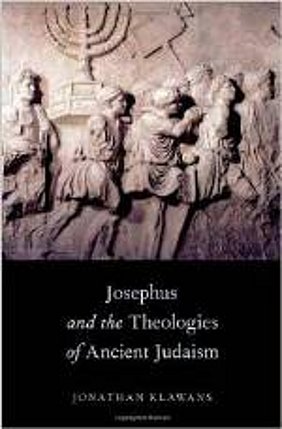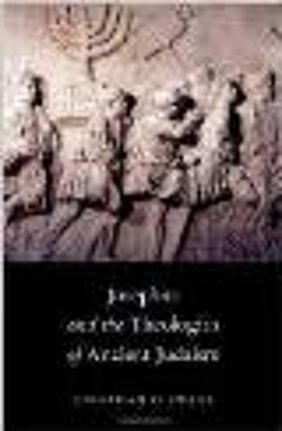Jonathan Klawans’s monograph is a welcome addition to the increasing body of literature devoted to the works of the first-century CE Jewish-Roman historian Flavius Josephus. Well known for his work in the history of Jewish law and ritual, Klawans in this book attempts to put Josephus closer to the center of all studies of ancient Judaism. His book focuses on Josephus’s descriptions of the three major Jewish religious movements (the Pharisees, the Sadducees, and the Essenes) to understand the theologies of ancient Judaism. He proposes that ancient Jewish religious disputes revolved primarily around matters of ritual law, including disagreements over the calendar, and purity practices. Through his examination of Josephus, Klawans challenges the widespread belief that Judaism was shattered by the cumulative events of 70 CE and 135 CE (First and Second Jewish Revolts). For Klawans, Josephus demonstrates that much of the vitality associated with rabbinic Judaism existed in the first century CE, and that there is no evidence that the three major Jewish movements disappeared after the 70 CE Roman destruction of the Jerusalem temple.
In the first chapter, “Theology, Josephus, and Understandings of Ancient Judaism,” Klawans reviews recent work on Josephus, and especially examines how scholars seek to understand his writings in light of classical Greco-Roman historiography. He opposes the skeptical perspective of the influential Josephus scholar Steve Mason, who believes that Josephus was such a creative author that it is difficult to discern historical realities behind his writings. In contrast, Klawans believes that Josephus remains our best, and most accurate, source for understanding ancient Jewish theological disputes as well as responses to the temple’s destruction.
In chapter 2, “Fate, Free Will, and Ancient Jewish Types of Compatibilism,” Klawans explores one of the most perplexing theological problems for the monotheistic faiths, namely, the controversy over fate and free will. According to Josephus, the three major Jewish religious movements disagreed over these issues. The Essenes believed that fate governs everything and nothing befalls people unless it is in accordance with fate’s decree. The Sadducees rejected fate. The Pharisees held a middle position: certain events are the work of fate but others depend on our own actions.
Klawans seeks to understand the contradictions concerning these concepts in Josephus by using the philosophic term “compatibilism.” This concept maintains that determinism (or fate) and free will are not contradictory, but compatible positions. It holds that a strict determinism can permit the possibility of some free choice and that humans are responsible for their actions, despite the fact that their consequences are determined in advance. For Josephus, whose views were closest to the Pharisees, all events are seen and guided by providence, but only some are fated. This belief allowed Josephus to make room for freedom of choice since human responsibility is an irrefutable doctrine in Jewish scripture.
In chapter 3, “Afterlives and Noble Deaths,” Klawans explores Josephus’s testimony regarding ancient Jewish views of the afterlife as represented in his descriptions of the three major Jewish religious movements. Klawans notes that it is important for scholars to distinguish between two general forms of afterlife beliefs: the immortality of the soul and the resurrection of the dead. The two are not mutually contradictory, and they can be compatible. Some Jewish texts incorporate both, but emphasize one belief over the other. For the Essenes, afterlife is incorporeal and otherworldly; the Sadducean denial of immortality is decidedly this-worldy; the Pharisaic belief is somewhere in between. Klawans suggests that Josephus’s accounts of the Pharisees on this issue are cryptic because this movement debated the precise nature of the resurrected body.
In chapter 4, “Torah, Tradition, and Innovation,” Klawans proposes that the Pharisees adhered to both scriptural and non-scriptural ancestral traditions, but that there is no evidence that the latter were considered of equal antiquity with scripture. The Sadducees adhered to a more literalist reading of scripture and largely rejected non-scriptural ancestral traditions. Klawans notes that Josephus did not explain adequately the Essene position on this issue. He attributed this reluctance in part due to the Essene belief in the continuation of prophecy. Because Josephus soundly rejected this belief, he to some extent ignored the Essene beliefs on this issue.
In chapter 5, “Josephus and Judaism after 70 C.E.,” Klawans challenges the widespread belief that Judaism was “shattered” by the cumulative events of 70 CE and 135 CE, and that many beliefs of rabbinic Judaism emerged centuries later. He argues that there was no decline in Jewish literature after 70 CE, and Judaism remained a vibrant and diverse faith following this catastrophe. He believes that there is no evidence that the three major Jewish movements disappeared after the temple’s destruction, but that Judaism remained a vibrant and diverse faith and developed many beliefs associated with later rabbinic Judaism shortly after 70 CE.
In his conclusion, Klawans comes to no clear explanation for the origin of the beliefs of the Pharisees, the Sadducees, and the Essenes. He states that the rise of these schools of religious thought cannot be explained by theological disagreements, purity disputes, or the break in the Zadokite family line of high priests. He urges scholars to exercise caution in trying to answer the question of their origins, noting that we only have limited evidence from the past.
Although this book focuses on theology, Klawans should have devoted more attention to historical matters, particularly the Maccabean rebellion, the creation of the Hasmonean state, and the influence of Hellenism. By focusing strictly on theology, Klawans overlooks the possible role that such historical events had on the formation and development of the major schools of Jewish thought and their theological beliefs, and he ignores the ways in which they survived the events of 70 CE. Klawans also fails to consider the possibility that Josephus’s social situation in Flavian Rome caused him to distort his accounts of ancient Jewish theology. The Dead Sea Scrolls, for example, show that messianism was a dominant feature of Essene theology. Because messianic speculation contributed to the outbreak of the First Jewish Revolt, Josephus omitted it from his discussions of the Essenes. Klawans, moreover, fails to explore the relationship between politics and the theological beliefs of the Pharisees and the Sadducees. John Hyrcanus broke with the Pharisees for political reasons and became a Sadducee. Salome Alexandra later switched the Hasmonean family’s sectarian affiliation to the Pharisees to retain power. This suggests that the Hasmoneans were not necessarily committed to either of these religious movements, but chose their religious affiliations for political reasons. Because each of the three major forms of ancient Judaism were closely connected with politics, any examination of their theological beliefs must also explore how their political associations likely contributed to the development of their beliefs.
Klawans’s book is the most comprehensive study of Josephus’s theological descriptions of the major forms of ancient Judaism. Despite some reservations expressed in this review, it is an important contribution to the field of Josephus studies and the theology of Second Temple Judaism. It is highly recommended for anyone wishing a readable introduction to ancient Jewish theology.



